G iving to those in need can be extremely rewarding. However, some in full time ministry have found that rather than being helpful, daily hand-outs can become harmful to the poor. How? They create a dependency.
The quote, “Give a man a fish; you have fed him for today. Teach a man to fish; you have fed him for a lifetime”, paints the ideal picture of how one should approach those in need. One local ministry, Urban Vision (UV), not only shares this mindset but has put into action. They don’t just give to the poor, but teach them the importance of earning what they recieve.
Urban Vision is an inner city ministry led by husband and wife Rodney and Jodi Matthews. Located in North Hill, they are dedicated to reaching low income families in the community. Many are refugees, particularly from Burma (See story archives 6/30/08).
“Many came through the International Institute of Akron. They were in refugee camps and fled their country under persecution for both religious and political reasons. Four to six hundred recently came into the Akron area,” Rodney, President of Urban Vision, said (See story archives 3/26/10).

Incorporating CCDA Principles
Much of UV’s philosophy is patterned after the Christian Community Development Association’s (CCDA) principles. CCDA came about in an attempt to answer how Christians should respond to the troubles of the poor.
Among their findings was the importance of living among the poor. This is what Rodney and Jodi Matthews have found to be crucial to their ministry.
It took them 17 long years to get the large church building that they are in now. Its location in the inner city is no mistake, but rather strategic.
“We’ve always believed in the principles set forth by CCDA and felt that it connected with our heart and vision as far as what we wanted to do with the people,” Jodi, Executive Director and Founder of Urban Vision, said.

Teaching Men to Fish
Another important principle of CCDA is empowerment; to empower individuals to take care of themselves and their own needs rather than enable them just to live on handouts.
“We believe in not just handing things to people. Everybody has something to give and I think that just affirms the dignity of the people,” Jodi explained.
One way that they incorporate this is through their “Urban Vision Dollar” system. Instead of just being given clothing, school supplies, food or anything else for free, both kids and adults in the neighborhood are expected to put forth an effort for what they receive. UV dollars are earned by attending classes, having good behavior, participating in activities, and memorizing Bible verses. Once the money is earned, they are free to spend it however they wish.
“The banking system is the bloodline of the dignity of the program,” Rodney said.
“It is saying, ‘We’re not just going to give this to you’,” Jodi added.
“We’ve created general stores and Christmas stores which give the kids a huge incentive to earn paper dollars. We call the Christmas store ‘Christmas with Dignity’ because the kids come with the money that they earn and shop for their families and themselves,” she continued.

Empowering Lives
Because of their location, there are plenty of needs in the community on a daily basis.
“One day a little girl came to me from kids club and handed me a note from her mom that said ‘We have no food, no groceries - nothing in the house,” Jodi shared.
The young girl had been coming to activities and accumulated money in her UV account. Because of this, Jodi purchased groceries for the family.
“When we walked to the door with groceries we could sense the mom feeling bad about the situation. When she thanked us, I said ‘Oh no, don’t thank me, you need to thank your children because they’ve been a part of the program,” Jodi said.
“All of a sudden mom re-directed her focus from me and started thanking the kids, saying ‘Oh kids I’m so glad’ and the whole atmosphere changed,” Jodi continued. “It promotes an attitude of giving for the kids because they’re so excited about giving to their moms.”
“We learned that dad would go out to the back door whenever a Caucasian family was giving to an African American family. He’s thinking ‘I can’t provide for my family and now I’ve got a white guy providing for my family?’ It’s the whole dynamic,” Rodney explained.
Caught in a Cycle
“We’re seeing too many kids, 4th, 5th generation on government assistance - to the point that it’s not even their fault anymore. They know no other way. You grew up looking at your mom and dad and the jobs they went to and said ‘Wow, I might want to be that,’ or ‘I might want to do this’. They don’t see that. It’s not there,” Rodney said.
Many kids who grow up in poverty tend to “inherit” a poverty mindset, unless taught differently.
“Over the years kids have said, “I’m going to have kids and I’ll get a check for having more kids’. Those kinds of comments are coming from teens and we’re asking ‘What are we teaching them?’ We’re teaching them that you can do nothing except have more kids and get more pay,” Rodney said.
“We’re trying to break that down,” he continued, “but unfortunately it’s almost like we do damage as the church if we’re doing the same thing that the government’s doing – giving hand outs.”
Christmas with Dignity
The Christmas with Dignity annual celebration is one of the many ways that UV spreads the message not only of the gospel, but of the importance of work ethic.
Every year before Christmas their large gym is filled with brand new items including microwaves, toaster ovens, clothing, toys and anything else imaginable.
“We’re not talking second hand” Jodi said, comparing their store to Target or Wal-Mart.
Those who participated in UV programs throughout the year and saved money are able to spend it however they wish. Excitement fills the room on that highly anticipated day.
For those who didn’t save, it’s another story.
“We will have people come to the Christmas store and say ‘I’m here for the free toy giveaway’ and I say ‘I’m sorry but this is not a free toy distribution. This is an incentive program for the kids that have been participants’,” Jodi said.
“It might appear cruel but at the same time I really feel that we’re a part of this community just as the kids are. We’ve committed our families, our lives, our homes and our resources and we want to see this community changed and we believe it will change,” she continued.
“Anyone who’s raised kids knows that they are going to try to get you to lower the bar or test where the bar is going to go, and these kids are no different except that people give up on them, and the bar goes lower. If you have no expectations you will get no results. What they feel from us is real love – tough love. Saying we’ll give them a way out is not really loving a child,” Rodney said.

To read Part Two of the story click on the link.
If you have any story ideas, questions, or comments you can contact me at Katie@akrone